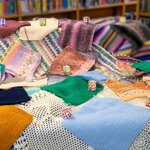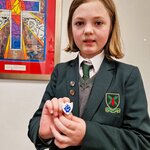You will follow a two year key stage three course, which has been carefully developed by your teachers to be engaging, interesting and challenging.
In years seven and eight your year group will be divided into two halves. Each half year group is then divided into five sets by ability.
Our school timetable is organised on a fortnightly cycle and in years seven and eight you will have five lessons of science each fortnight, and receive approximately one piece of homework each week.
Year 7
In year seven you will study two units of biology, two units of chemistry and one unit of physics.
Biology Unit One
In this unit you will study the difference between animal and plant cells, how substances move into and out of cells and how these cells work inside whole organisms. You will also study the topics of reproduction, pregnancy and birth, learning about what happens during puberty and the menstrual cycle. You will also investigate plant structures and how the structure of seeds help them to be carried away from the parent plant. In this unit you will carry out practical investigations to test a leaf for starch and investigate the effect of light on the ability of plants to make their own food through photosynthesis.
Biology Unit Two
In this unit you will study what happens during the process of digestion and learn about the jobs of the different organs in the digestive system. You will also learn about the how the breathing system and circulatory system work, carrying out a heart dissection so you can investigate the structures of the heart. You will also investigate how exercise affects our breathing rate and heart rate, and why any changes need to take place. You will learn about the effects of different recreational drugs and why there is variation amongst us because of differences in our genes.
Chemistry Unit One
In this unit you will learn about the apparatus used In the science laboratory and how to use it safely, as well as how to use chemical symbols to know how hazardous different chemicals are. You will study the difference between chemicals called acids and alkalis and carry out practicals using red cabbage to identify these chemicals as well as using chemicals to carry out neutralisation reactions. You will also carry out tests to identify unknown gases, so that you can identify if a gas is hydrogen, oxygen or carbon dioxide. You will carry out chemical reactions between different metals and acids and use these to help you write chemical equations. You will then go on to study how different rocks in the earth form and how one type of rock can change to become another type of rock.
Chemistry Unit Two
In this unit you will study fire safety and investigate the effect of different factors on whether or not a fire can burn. You will investigate the different products when fuels are burned and how an increase in oxygen affects burning. You will learn how the products of burning fossil fuels can impact on the environment and how the burning of some fuels can cause acid rain and contribute to global warming. You will also study particle theory, how the particles are arranged in solids, liquids and gases and what this means for the properties of these materials.
Physics Unit One
You will learn about the different types of energy and how energy transfers take place as well as the differences between renewable and non-renewable energy resources. You will study the structure of the ear and how sound travels, the differences between reflection and refraction and how we see different colours. You will investigate how pinhole cameras work and the differences and similarities between these cameras and the eye.
Year 8
In year eight you will study one unit of biology, one unit of chemistry and two units of physics.
Biology Unit One
In this unit you will study the reasons for variations between individuals and why we are not all the same. You will learn how animals are classified and why they are put in to specific groups. You will learn how animals and plants are adapted to survive in different habitats and how organisms depend on one another. You will also learn how micro-organisms cause disease and how our bodies defend us against infection, including how vaccination can help to protect us against diseases.
Chemistry Unit One
In this unit you will study the difference between elements and compounds and what the periodic table, containing all the elements, can tell us. You will also investigate the reactivity of different elements and how this can be used to carry out displacement reactions. You will carry out practicals experiments to separate different materials through processes including evaporation, distillation and chromatography
Physics Unit One
In this unit you will build different circuits and learn about the difference between series and parallel circuits. You will model electricity, discover what voltage is and learn how to measure resistance. You will also investigate how magnets and electromagnets work, carrying out a practical to study how the strength of an electromagnet can be changed. You will also study different methods of transferring heat and learn about the differences between conduction and convection.
Physics Unit Two
In this unit you will learn why we have different seasons, the difference between gravity and weight and why our weight would be different on different planets. You will study different forces, the difference between balanced and unbalanced forces and how this affects the movement of objects. You will also study how to calculate speed and pressure and investigate the effect of water resistance on different shaped objects.
(1).png)
.png)
.jpg)


